*waves* Blog is mainly fandom, writing and trippy things: DS9, West Wing, Doctor Who and other side-obsessions. Going through a Garak/Bashir phase at moment ( you might have noticed). Also occasional attempts at drawing and vidding. Like chatting about ideas.
Don't wanna be here? Send us removal request.
Photo
Made this ten years ago for the 50th... reblogging for the 60th. Happy new Doctor Who day everyone.










7K notes
·
View notes
Photo

― Donnie Darko (2001) Donnie: I promise that one day, everything’s gonna be better for you.
2K notes
·
View notes
Text
Also, I think this is alternative Bashir. Not 100% sure because the actor hasn’t done much since and then went on to be a director/ teacher at RADA... but it’s the name on IMDb and, lets face it, this photo does sort of scream ‘ FRONTIER MEDICINE with no clue what I’m doing and oh crap, I’m in love with a lizard’.

ever since i found out that peter capaldi auditioned to be sisko ive been desperate to see his version of the "in the pale moonlight" speech. avery brooks did it best but still i know capaldi would have acted his heart out on that. he plays guilt and pent up anger so well he would have been perfect. somebody that still has a twitter tell him we need this
221 notes
·
View notes
Photo

On December 6th 1989, fourteen young women, many of them engineering students, were murdered in the mass shooting at Montreal’s École Polytechnique that was prompted by the killer’s hatred of women and what he said was “fighting feminism”. On December 6, the National Day of Remembrance and Action on Violence Against Women, we remember: Geneviève Bergeron Hélène Colgan Nathalie Croteau Barbara Daigneault Anne-Marie Edward Maud Haviernick Maryse Laganière Maryse Leclair Anne-Marie Lemay Sonia Pelletier Michèle Richard Annie St-Arneault Annie Turcotte Barbara Klucznik-Widajewicz
11K notes
·
View notes
Text
Sisko is awesome. He’s a quiet, one man 24th Century equal access revolution. He’s the Captain who:
Wrote a letter of recommendation to allow the first (and only) Ferengi to join Starfleet
Had the first (and only) Klingon in Starfleet as his Commander. AT THE TIME that it seemed very likely the Federation and the Klingons were about to go to war.
Pulled strings to keep the first (and only) openly Augmented Officer in Starfleet from losing his commission and kept him on as his Doctor even though he was illegal. ALL WHILE never once mentioning that Bashir had lied to him for five years.
Had the only Changeling in the quadrant as his Chief of Security. AT THE SAME TIME as there was a mass-panic about Changelings and the Federation were at war with them. AND never once suggested Odo try and become more humanoid…
Half of his senior staff are exceptions. He supports them quietly and, presumably, behind the scenes defends their right to be there, mostly without them knowing it. Sisko rocks.
5K notes
·
View notes
Photo


Aged up Garak and Bashir because I was playing around with how to do a cheap, cheerful & quick way to do Deep Fake videos but with gifs. Really simple to do, you just have to find an image that it’ll work for.
1.) Put through still image from DS9 or another show actors are in through FaceApp and either age them up and/or use beard filters.
2.) Put aged-up still image through My Heritage Deep Nostalgia app, which animates it to make it move.
3.) Convert that video into gif and cut out the bits that work.
Whole thing takes about 10 minutes per gif.
#deep space nine#ds9 ark#bashir#Garak#Alexander Siddig#Andrew Robinson#how to#although there's probably a better way#this way is very quick and free though
138 notes
·
View notes
Photo

Bad Dreams Deep Space Nine Fic: Chapter Twelve: Nothing Comes From Nothing.
Story summary: After losing his Federation citizenship, Julian Bashir is stuck in utopia. He can’t get a job or a home. He’s not allowed to leave Earth. He has no future in a society that doesn’t want Augments to exist.
Section 31 make Bashir an offer. Complete one mission for them and they’ll give him his citizenship back. He’ll be accepted into paradise. They’ll even allow him to be a doctor again.
What could be simpler? All he has to do is travel to Cardassia and persuade Garak, High Castellan of the Union, to take his people into the Federation….
In this chapter: Garak finally gets to talk to Kel and Bashir is ship-wrecked in a salt desert: https://archiveofourown.org/works/20655953/chapters/98189883
4 notes
·
View notes
Text
i miss when you could make political art without placing personal identity (and the self) at the center of everything
106K notes
·
View notes
Text
if ur politics are centered in any way on rooting out the "bad" people in the world and then being able to live in a utopia then congratulations, uve ended up at fascism and I am not in any way exaggerating
the only way to truly and genuinely prevent harm is by first acknowledging that all human beings are capable of causing harm to others if given the right circumstances, including u
u genuinely must first understand and accept that if given the right circumstances u personally would harm others and that the only way to prevent that is to be constantly checking ur own behavior and making sure there are safeguards in place to protect people against harm. none of us are immune to propaganda, neither are we immune to causing harm
otherwise, if u believe that any innate part of u (being a woman, gay, a person of color, ect.) means that u couldn't possibly be capable of harm, then it is only a matter of time and circumstance before u hurt another person, if u aren't already
19K notes
·
View notes
Photo
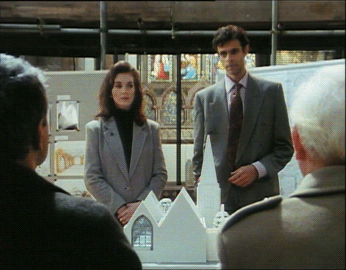
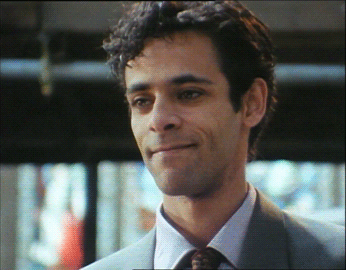





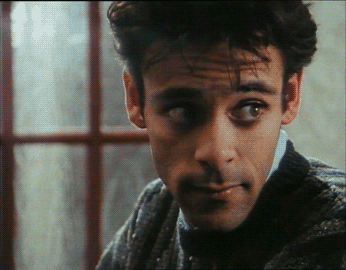
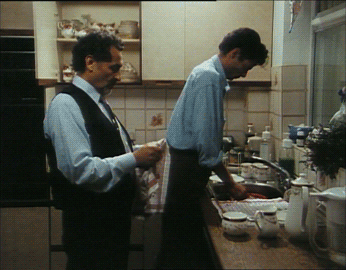
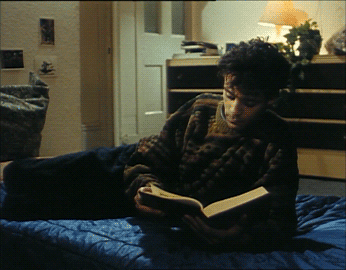
Alexander Siddig as Yousef in The Big Battalions, Episode 1 (1992)
A 26 (maybe 25 at time of filming) year old Alexander Siddig’s (credited here as Sid El Fadil) first major TV role and second major role of any kind (his only previous credits being as an unnamed party guest in an obscure film and as Prince Feisal in A Dangerous Man: Lawrence After Arabia), The Big Battalions aired on UK TV in 1992 and disappeared, never getting any kind of home video or streaming release and essentially becoming lost media. Thanks to the dedicated efforts of members of the Sid City Social Club and with the help of series writer Hugh Stoddart, The Big Battalions is now available to stream, for free, to UK residents (and, wink nudge, UK IP addresses generally) here on All4. This is the first time the series, and Sid’s performance in it, have been seen in 20+ years.
#Great gifset sigynpenniman#the big battalions#alexander siddig#sid el faddil#It's a really interesting show#available now on channel 4/ All 4 on demand
2K notes
·
View notes
Text
I do consider it fanfiction/ fanscript, yes :-) Although I figured it didn’t really fit into the answers of any of the questions. Thanks for giving me the opportunity to plug it though: Sid and Django did such a great job. I’ve changed how I write Giel in Bad Dreams to be more like Django’s performance now.
Writer Tag Game
Thanks for @conceptadecency for tagging me. I’m going tag @damnhardwork @syaunei, @alphacygni-8 and @agrippaspoleto plus anyone else who’d like to do this.
How many works do you have on AO3?
Eight.
What’s your total AO3 word count?
88878
What are your top 5 fics by kudos?
1. In Times Of War
2. The Chameleon & The Magpie
3. Bad Dreams (still a WIP though, sequel to In Times Of War)
4. Garak’s Letter Back
5. My Friend
Do you respond to comments, why or why not?
Yes. I tend to write back unless life and work has gotten super busy. It’s always nice to chat to people and talk about ideas.
What’s the fic you’ve written with the angstiest ending?
Garak’s Letter Back. More bittersweet than angsty though.
What’s the fic you’ve written with the happiest ending?
Chameleon & The Magpie. DS9 but with His Dark Materials style animal daemons.
Do you write crossovers? If so, what is the craziest one you’ve ever written?
A Rosencrantz & Guildenstern Are Dead/ DS9 crossover called Incredible Tales. Basic plot: Bashir and O’Brien realise they’re actually characters in one of Benny’s stories and try and fail to change the course of events from In The Pale Moonlight. It’s definitely a crazy trip…
Have you ever received hate on a fic?
Depends on the definition of hate. 99% of people in the fandom are lovely, generous, and kind. I’ve received a couple of comments from people who one aspect of my writing was problematic ( basically I described Bashir as ‘the Englishman’ and that was taken to somehow to be whitewashing? Apparently you can’t be English and not white or something… I dunno, it was baffling.)
Do you write smut? If so what kind?
No.
Have you ever had a fic stolen?
No.
Have you ever had a fic translated?
Yes. Someone asked ages ago if they could translated into Russian for a Russian fic website. I said yes, it’s all cool and stuff.
Have you ever co-written a fic before?
No. I’ve had a lot of help from other people though in terms of ideas and plot points for my fics, but nothing where we wrote it together.
What’s your all-time favourite ship?
Depends on what I’m writing to be honest. I don’t really focus on the ships.
What’s a WIP that you want to finish but don’t think you ever will?
I have one WIP in progress at the moment which is Bad Dreams. It’s been a while but I’m sure I’ll finish it. I write slowly and usually only one fic at a time, but I do always eventually finish stuff I’ve started.
What are your writing strengths?
Structure, ideas, jokes.
What are your writing weaknesses?
Writing speed. I write very, very slow. It takes me literal years to finish a multi-chapter fic. Also description of movements, people getting from one place to another in a scene, Really struggle with that. I have discovered from beta editors that I don’t know how to correctly use semi-colons (does anyone?) Also sometimes because I’m more used to writing or editing scripts for work, I forget to put in a character’s internal dialogue, emotions and thoughts when writing prose. Sort of figure ‘well it’s the actors job’ and then am like ‘oh no, wait – this is a story, there’s no actor’.
What was the first fandom you wrote for?
I was going to say DS9, but I *did* write a story for a Big Finish Doctor Who submission when I was about eighteen that got rejected, so I turned it into a fic and put it on fanfiction.net. Then there was a 10 year gap before I got into fanfic proper with DS9.
What’s your favourite fic you’ve written?
I’m pretty happy with In Times of War and it’s sequel Bad Dreams. There’s stuff I’d do differently now in terms of writing In Times of War if I did it again ( it’s all written in the present tense and I would change that now, but hey-ho) but I think the ideas, characters and plots of both those stories are really strong.
27 notes
·
View notes
Text
Writer Tag Game
Thanks for @conceptadecency for tagging me. I’m going tag @damnhardwork @syaunei, @alphacygni-8 and @agrippaspoleto plus anyone else who’d like to do this.
How many works do you have on AO3?
Eight.
What's your total AO3 word count?
88878
What are your top 5 fics by kudos?
1. In Times Of War
2. The Chameleon & The Magpie
3. Bad Dreams (still a WIP though, sequel to In Times Of War)
4. Garak’s Letter Back
5. My Friend
Do you respond to comments, why or why not?
Yes. I tend to write back unless life and work has gotten super busy. It’s always nice to chat to people and talk about ideas.
What's the fic you've written with the angstiest ending?
Garak’s Letter Back. More bittersweet than angsty though.
What's the fic you've written with the happiest ending?
Chameleon & The Magpie. DS9 but with His Dark Materials style animal daemons.
Do you write crossovers? If so, what is the craziest one you’ve ever written?
A Rosencrantz & Guildenstern Are Dead/ DS9 crossover called Incredible Tales. Basic plot: Bashir and O’Brien realise they’re actually characters in one of Benny’s stories and try and fail to change the course of events from In The Pale Moonlight. It’s definitely a crazy trip…
Have you ever received hate on a fic?
Depends on the definition of hate. 99% of people in the fandom are lovely, generous, and kind. I’ve received a couple of comments from people who one aspect of my writing was problematic ( basically I described Bashir as ‘the Englishman’ and that was taken to somehow to be whitewashing? Apparently you can’t be English and not white or something… I dunno, it was baffling.)
Do you write smut? If so what kind?
No.
Have you ever had a fic stolen?
No.
Have you ever had a fic translated?
Yes. Someone asked ages ago if they could translated into Russian for a Russian fic website. I said yes, it’s all cool and stuff.
Have you ever co-written a fic before?
No. I’ve had a lot of help from other people though in terms of ideas and plot points for my fics, but nothing where we wrote it together.
What’s your all-time favourite ship?
Depends on what I’m writing to be honest. I don’t really focus on the ships.
What’s a WIP that you want to finish but don’t think you ever will?
I have one WIP in progress at the moment which is Bad Dreams. It’s been a while but I’m sure I’ll finish it. I write slowly and usually only one fic at a time, but I do always eventually finish stuff I’ve started.
What are your writing strengths?
Structure, ideas, jokes.
What are your writing weaknesses?
Writing speed. I write very, very slow. It takes me literal years to finish a multi-chapter fic. Also description of movements, people getting from one place to another in a scene, Really struggle with that. I have discovered from beta editors that I don’t know how to correctly use semi-colons (does anyone?) Also sometimes because I’m more used to writing or editing scripts for work, I forget to put in a character’s internal dialogue, emotions and thoughts when writing prose. Sort of figure ‘well it’s the actors job’ and then am like ‘oh no, wait – this is a story, there’s no actor’.
What was the first fandom you wrote for?
I was going to say DS9, but I *did* write a story for a Big Finish Doctor Who submission when I was about eighteen that got rejected, so I turned it into a fic and put it on fanfiction.net. Then there was a 10 year gap before I got into fanfic proper with DS9.
What’s your favourite fic you’ve written?
I’m pretty happy with In Times of War and it’s sequel Bad Dreams. There’s stuff I’d do differently now in terms of writing In Times of War if I did it again ( it’s all written in the present tense and I would change that now, but hey-ho) but I think the ideas, characters and plots of both those stories are really strong.
27 notes
·
View notes
Photo

Christopher Eccleston: Why my Doctor had to be northern
“If you’re an alien how comes you sound like you’re from the north?” Billie Piper’s Rose Tyler asked The Doctor ten years ago – now Christopher Eccleston has finally revealed why his Time Lord had a northern accent.
“Lots of planet have a north” the Doctor told Rose way back then, but Eccleston (who returns to our TV screens in ITV’s new thriller Safe House on Monday April 20th at 9pm) gives a rather different answer in this week’s edition of Radio Times.
“I wanted to move him away from the RP (received pronunciation) for the first time because we shouldn’t make a correlation between intellect and accent” he says, “although that still needs addressing”.
The self-described working-class actor also says that cultural inequality is “much more pronounced” in Britain than it used to be, and that it would be difficult for a young actor with his background to succeed in the industry today.
“You can’t blame Eddie Redmayne or Benedict Cumberbatch but inequality will lead to a milky, anodyne culture. To an extent that’s already happened,” he argues.
Eccleston stresses that it’s not just about the working class though. “There’s not enough writing for women or people of colour” he says. “It frustrates me when they insist on doing all-male Shakespearean productions – a wonderful intellectual exercise, maybe, but it’s outrageous because it’s putting a lot of women out of work.”
59K notes
·
View notes
Text
Or, ideally in a utopia, Garak would also learn a lot talking to Bashir because he’s the descendant of the British people who did the colonising... just as much he’s the descendant of the people colonised?
I think in a utopian society, you’d hope the British part of Bashir would be able to accept that part of his inherited history. You’d hope he’d be able to face that and it was integrated into his national identity.

perspective
2K notes
·
View notes










